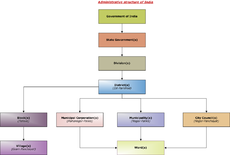- Chief Election Commissioner of India
-
The Chief Election Commissioner heads the Election Commission of India, a body constitutionally empowered to conduct free and fair elections to the national and state legislatures. Chief Election Commissioner of India is usually a member of the Indian Civil Service and mostly from the Indian Administrative Service.
The President of India appoints the Chief Election Commissioner and two Election Commissioners. They have tenure of six years, or up to the age of 65 years, whichever is earlier. They enjoy the same official status and receive salary and perks as available to Judges of the Supreme Court of India. The Chief Election Commissioner can be removed from office only through impeachment by Parliament. Despite the recent changes in the hierarchy, the system always had powers to impose unambiguous rules and guidelines that applied across the entire nation e.g. as to how the ballots will be cast and counted, what will be regarded as 'unqualified' vote (something whose importance became very evident during US presidential election in 2000). India was probably one of the first countries in the World to go for a completely electronic ballot in the last elections. What made this remarkable was the fact that the Office of the Chief Election Commissioner had successfully implemented this across the entire diverse Indian population that also consisted of the rural illiterate people.
While the office has always been an important one in the machinery of the Indian political process, it gained significant public attention during the tenure of T.N. Seshan, from 1990-1996. Mr. Seshan is widely credited with undertaking a zealous effort to end corruption and manipulation in Indian elections. Though he made significant progress, several politicians attempted to derail these efforts. In particular, the expansion of the Election Commission to include the two Election Commissioners (in addition to the Chief Commissioner) was seen as a move to curtail the commission's ability to act aggressively.
Chief Election Commissioners
The following have held the post of the Chief Election Commissioner of India [1] :
- Sukumar Sen ICS (b. 1899) : 21 March 1950 to 19 December 1958
- K. V. K. Sundaram : 20 December 1958 to 30 September 1967
- S. P. Sen Verma : 1 October 1967 to 30 September 1972
- Dr. Nagendra Singh : 1 October 1972 to 6 February 1973
- T. Swaminathan : 7 February 1973 to 17 June 1977
- S. L. Shakdhar : 18 June 1977 to 17 June 1982
- R. K. Trivedi : 18 June 1982 to 31 December 1985
- R. V. S. Peri Sastri : 1 January 1986 to 25 November 1990
- V. S. Ramadevi : 26 November 1990 to 11 December 1990
- T. N. Seshan : 12 December 1990 to 11 December 1996
- M. S. Gill : 12 December 1996 to 13 June 2001
- J. M. Lyngdoh : 14 June 2001 to 7 February 2004
- T. S. Krishnamurthy : 8 February 2004 to 15 May 2005
- B. B. Tandon : 16 May 2005 to 29 June 2006
- N. Gopalaswami : 30 June 2006 to 20 April 2009
- Navin Chawla : 21 April 2009 to 29 July 2010
- Shahabuddin Yaqoob Quraishi : 30 July 2010 - till date
Republic of India Part of the series
Politics and Government of India- Election Commission
- Chief Election Commissioner
- Governor
- State Legislature:
- Vidhan Sabha
- Vidhan Parishad
- Panchayat
- Gram panchayat
- Panchayat samiti
- Zilla Parishad

- Other countries
- Politics Portal
- Government of India Portal
 Elections in India
Elections in IndiaGeneral elections
(Lok Sabha)Presidential elections Legislative Assembly
(Vidhan Sabha → Rajya Sabha)1952 · 1998 · 2003 · 2004 · 2005 · 2006 · 2007 · 2008 · 2009 · 2010 · 2011 · 2012 ·
Andhra Pradesh · Arunachal Pradesh · Assam · Bihar · Chhattisgarh · Goa · Gujarat · Haryana · Himachal Pradesh · Jammu and Kashmir · Jharkhand · Karnataka · Kerala · Madhya Pradesh · Maharashtra · Manipur · Meghalaya · Mizoram · Nagaland · Orissa · Punjab · Rajasthan · Sikkim · Tamil Nadu · Tripura · Uttar Pradesh · Uttarakhand · West BengalUnion territories elections Delhi · PuducherryReferences
- ^ "Previous Chief Election Commissioners". Election Commission of India. http://www.eci.gov.in/Audio_VideoClips/previous-ces.asp.
The dates are wrong some people were only Election Commissioner and became Chief Election Commissioners much later
Categories:- Chief Election Commissioners of India
Wikimedia Foundation. 2010.

